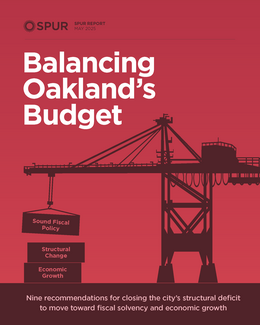In Oakland, public trust is being tested by a structural budget deficit that threatens services. A recent survey by the Oakland Budget Advisory Commission found that 78% of respondents disapprove of the city’s leadership, citing a lack of transparency and dissatisfaction with budget management. Although Oakland’s fiscal crisis reflects the lasting effects of the COVID-19 pandemic, it long predates the pandemic. For decades, revenues have failed to keep pace with rising costs for pensions, health care, and operations — except over a three-year period when the city strengthened and adhered to its fiscal policies. Those policies are a good starting place for righting Oakland’s fiscal ship. Other measures could help the city stabilize its budget and set the stage for extending economic prosperity to all Oaklanders.
To close its structural deficit, Oakland must commit to following its own sound financial policies, align on a budget stabilization plan, make structural changes to municipal operations, and promote long-term thinking to grow Oakland’s economy inclusively. Our report offers nine recommendations to achieve these goals.
